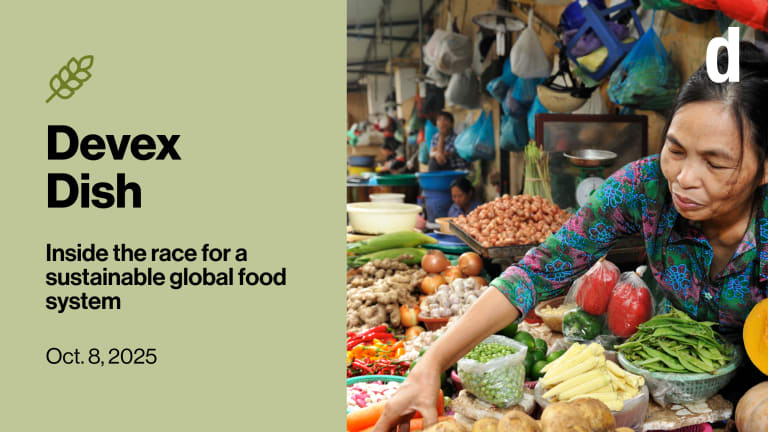
December 2015 has proven to be a pivotal month in finding global consensus to combat climate change and mitigate — and adapt to — its consequences. More than 190 nations came together in Paris for the United Nations Climate Change Conference, known as COP21, to establish a long-term global framework to reduce global greenhouse gas emissions.
In tandem with COP21, Devex and our partners — Abt Associates, Chemonics, HELVETAS, Tetra Tech, the United Nations Development Program and Zurich — hosted Planet Worth, an online conversation exploring leading solutions to address climate change. Through expert commentary and the latest news and views from COP21, Planet Worth examined how the impact of climate change on livelihoods and ecosystems cuts across sectors and is linked to key issues like migration, water access and food security.
This week, the Planet Worth campaign winds down, but the conversation around climate change is arguably louder and more urgent than ever. Here we highlight three key takeaways that emerged from the campaign:
1. Invest in resilient livelihood strategies.
While climate change affects all of us, extreme weather and rising temperatures most acutely impact the world’s poorest people, 70 percent of whom live in rural areas and depend on agriculture for their livelihood with small island developing states often bear the brunt of the adverse impacts of climate change. Experts say that harnessing technology, science and modern farming practices is critical to enabling the most vulnerable communities to adapt to and bounce back from climate-related events.
Some of these climate-smart practices include integrated pest management, crop rotation, agro-forestry and more efficient water management, wrote Ray Offenheiser, president of Oxfam America. According to the World Resources Institute, an estimated 3.5 billion people will live in water-scarce regions in the next decade, which will strain smallholder farms. Drip irrigation and catchment systems are effective ways to manage water use, while planting trees and grass to prevent erosion from deforestation frees up land for farming on hillsides, Chemonics’ Neal Donahue, Rob Henning and Justin Kosoris noted. Also critical to this effort is giving women farmers, who will be disproportionately impacted, access to the education and training to adopt modern agricultural practices.
In her guest commentary, Mary Robinson, the U.N. secretary-general’s special envoy on climate change and president of the Mary Robinson Foundation, added that ultimately ensuring resilient livelihoods for the world’s poor is an issue of human rights and climate action. “When we talk about resilience, we are talking about the opportunity for people to live lives of dignity and opportunity.”
2. Don’t overlook the potential of smart cities in mitigating climate change.
More than 3.5 billion people live in cities today, and that number is expected to increase by 2.5 billion by 2050. As urban growth and climate change become increasingly linked, building smart cities has emerged as a game-changing strategy to mitigate climate change and protect the health of the global population. Fortunately, with the right vision and support, large urban areas can be pioneers in climate stability and resilience.
Devex investigates the ways cities are working to protect their residents against environmental challenges.
Some cities, including Portland, Durban, New York and Mexico City, are already putting in place measures to reduce their emissions while still thriving in a new climate normal. These cities are implementing systems, like sustainable bus transit, light rails, and bicycle lanes, to reduce greenhouse gas emissions, encourage people to drive their cars less and improve air quality. Durban has focused on adaptation planning for water resources, human health and disaster risk management. Mexico City has reduced its emissions by 6 million tons through infrastructure initiatives. Another example is Sao Paulo, which leveraged private partnerships to build an integrative metro line to try to connect multiple modes of mass transit.
Climate experts say that these inventive short-term infrastructure projects should be coupled with long-term strategies to build urban resilience and address related social and economic issues. And development donors and implementers must make sure all these efforts are grounded in good governance and demonstrate inclusion and transparency.
3. Effectively addressing climate change calls for out-of-the box thinking.
Read more about breakthrough innovations
Devex investigates the role of the private sector in implementing the new development agenda through financial assistance, technological innovations, breakthrough methods and public-private partnerships.
Development practitioners and programs are focusing on science, technology and inclusive strategies to deliver breakthrough solutions for energy, agriculture, finance and more.
At COP21, governments and the private sector announced partner initiatives to advance climate change solutions. The Mission Innovation is a coalition of 20 countries that have pledged to double their climate research and development through 2020. While the Bill & Melinda Gates Foundation and 28 investors have launched the Breakthrough Energy Coalition, which will invest in new energy technologies that are affordable, reliable and sustainable.
Colin McQuistan of Practical Action stressed that technologies must be appropriate to the country context, inexpensive and easy to use in order to be effective. Some tools that are already making an impact are solar-powered pumps, which make it easier for farmers to extract water deep in the ground, and drip-irrigation systems for farmers facing droughts.
Sometimes it’s not just the technology itself that is a game-changer but how we approach the process and involve the end users — farmers, in this case. Arjumand Nizami, country director for Pakistan at Swiss development organization HELVETAS, advocates for a human-centered design process, in which farmers help guide the development of a tool or technique based on their user experience. She adds that strategic partnerships should not be discounted in the innovation discussion. For example, in Pakistan, farmers, universities and the government are working together; farmers share their knowledge on how seasons change and the impact of climate change on their harvests, which researchers then use to make recommendations for the government to implement at scale.
Small island nations, which bear the brunt of adverse effects of climate change, are also looking at innovative ways to adapt to climate change and prepare for extreme weather events. Ralph Gonsalves, the prime minister of St. Vincent and the Grenadines, said that his country has implemented a disaster management program that applies to legislative and organizational processes as well as supporting families to create a plan. The country is committed to having 80 percent of its electricity produced by renewables by 2018, Gonsalves said.
We would like to thank our partners and the Devex community for participating in the Planet Worth conversation. Although the campaign may have ended, the conversation continues as we transition from this breakthrough year in global development to a new post-2015 era.
Planet Worth is a global conversation in partnership with Abt Associates, Chemonics, HELVETAS, Tetra Tech, the U.N. Development Program and Zurich, exploring leading solutions in the fight against climate change, while highlighting the champions of climate adaptation amid emerging global challenges. Visit the campaign site and join the conversation using #PlanetWorth.
Read more about resilient livelihoods
Devex investigates climate-smart agriculture as an integrated approach to achieving food security, mitigating the effects of climate change and contributing to broader development goals.








